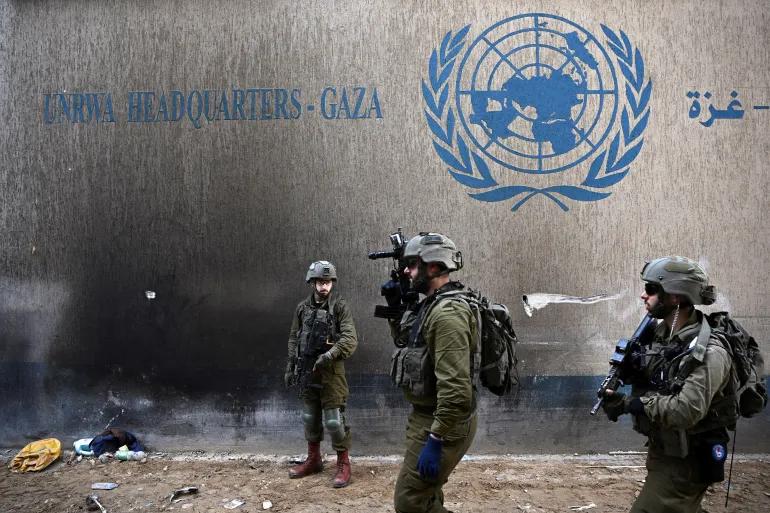Israel’s Ban on UNRWA Sparks Concerns of Humanitarian Crisis for Palestinian Refugees
31 October 2024 - 07:20

Israel's recent decision to ban the United Nations Relief and Works Agency for Palestine Refugees (UNRWA) has drawn sharp criticism from international analysts and Palestinian rights advocates, who warn that the move could render life “unbearable” for Palestinian refugees in Gaza and the West Bank. The legislation, set to take effect in three months, will effectively end UNRWA’s services, which have provided essential aid, healthcare, and education to millions of Palestinian refugees since 1948.
Analysts contend that the ban marks a significant step in Israel’s campaign to disrupt aid infrastructure and increase pressure on Palestinians to leave the occupied territories. Tahani Mustafa, a Palestine expert with the International Crisis Group, described the ban as part of a “broader objective” to displace Palestinian communities permanently. The restriction on UNRWA will hit Gaza especially hard, where nearly 2.3 million Palestinians already face dire conditions under an Israeli land, sea, and air blockade imposed since 2007.
UNRWA: A Lifeline in Gaza
UNRWA has been the principal aid provider for Palestinians, supplying health services, education, food, and shelter to those affected by conflict. Khaled Elgindy, a senior fellow at the Middle East Institute, voiced concerns that the ban would strip Gaza residents of crucial support. “Israel seems intent on making life in Gaza so unbearable that people will have no choice but to leave,” Elgindy stated. This intensifies fears that the humanitarian conditions in Gaza, often described as an “open-air prison,” could worsen dramatically.
With tensions running high following a year of intense conflict, Gaza has witnessed devastating losses. Reports indicate that over the last year, Israeli forces have killed over 43,000 Palestinians in Gaza and forcibly displaced countless others. The recent war began after a large-scale attack on southern Israel by Hamas, leading to an escalating cycle of violence that has devastated Gaza’s infrastructure and civilian population.
Historical Context: UNRWA and Palestinian Rights
UNRWA was established by the UN General Assembly in 1949, following the mass displacement of Palestinians, known as the Nakba or “catastrophe,” when 750,000 Palestinians were forced from their homes during the creation of Israel. The agency has since operated in the West Bank, Gaza, Jordan, Syria, and Lebanon, assisting refugees until a resolution for their return can be achieved, as per UN Resolution 194.
However, the agency’s role has been fraught with controversy, with the U.S. and Israel frequently criticizing UNRWA for allegedly perpetuating the refugee crisis. Former U.S. President Donald Trump halted U.S. funding for the agency in 2018, sparking a funding crisis that has persisted since. For many Palestinians, the cessation of UNRWA’s services symbolizes an erosion of their rights, particularly the right to return.
Impact on Palestinian Authority and International Response
The Palestinian Authority (PA), which governs parts of the West Bank, now faces pressure to fill the gap left by UNRWA. However, many experts, including Diana Buttu, former legal advisor to the Palestine Liberation Organization, believe this is an unrealistic expectation. Buttu cautions that the PA’s limited resources and authority would make it nearly impossible to replicate UNRWA’s services, especially given its extensive infrastructure and experienced personnel.
The international community has voiced concern over the ban. Amali, a Palestinian analyst, warned that if global leaders fail to intervene, they risk allowing Israel to “erase Palestinian identity and rights by dismantling institutions that serve as reminders of the Nakba.” Some speculate that Israel’s actions against UNRWA may undermine not only Palestinian rights but also Israel’s standing with international bodies, especially as it recently faced backlash for actions at the United Nations.
Looking Forward
As the three-month countdown to the ban on UNRWA’s operations begins, Palestinians in Gaza and the West Bank brace for a future filled with uncertainty. With the looming absence of critical services, many worry that the humanitarian situation could reach an unprecedented crisis level. Meanwhile, rights groups and UN officials continue to push for diplomatic resolutions and increased humanitarian assistance to Palestinians facing escalating hardships.
The decision to dismantle UNRWA adds a new dimension to the already complex Israel-Palestine conflict, raising questions about the fate of millions who rely on its services and the potential for renewed global scrutiny of Israel’s policies toward Palestinian refugees.

